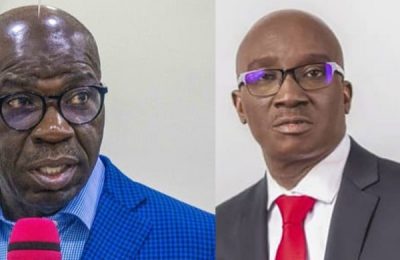SAMPLE 1: “…If there’s anyone that is to be in-depth to Tinubu, then it should be Obasanjo. So contrary to the claims of some Tinubu’s political loyalists who claim that APC owes Tinubu its presidential ticket, APC has paid off Tinubu and doesn’t own him its presidential ticket”. (How APC reciprocated Tinubu’s gestures, Opera News, 12 March, 2022)
Two words, as used in the text under examination, require significant intervention and redemption: in-depth and own. The distortions in their graphic representation as well as their meaning are so fundamental as to undercut the writer’s presumed claim to functional literacy. The writer, in spite of himself, however, has been able to offer correctly the form and meaning of the lexeme owe (in its third person singular form). And so, we have the integrity of that verb (owe) and the context in which the offending words occur to thank for the redemption of the forms in-depth and own.
To recover the form and meaning, we need to provide clarification and example sentences on the following forms: in-depth, indebted, depth, debt, owe, own.

Let’s start with the form: in-depth. Here is the context in which the word appears: “if there’s anyone to be in-depth to Tinubu…” It should be safe, I think, to assume that the word distorted here by the writer is indebted. This is a rather weird mis-representation. At any rate, what does in-depth mean? An in-depth discussion, analysis, or report is one that is significantly detailed, thorough or deep. This is the sense conveyed by the word in each of the following sentences: 1) An in-depth investigation needs to be conducted into the recent student riots. 2) The tv station has become popular for its consistent in-depth reports. 3) Although he describes his report as in-depth, but nothing can be more shallow. 4) I agree that a report can be wide-ranging without being in-depth. 5) This is an in-depth philosophical analysis. 6) He came up with an in-depth presentation of facts and figures.7) The in-depth reports of foreign election observers were later presented to the press. 8) The newspaper is no longer living up to its reputation of presenting in-depth reports. 9) Rumours have it that an in-depth intelligence report has been submitted to the President on the sabotage involving the National Grid. 10) An expert has been commissioned to do an in-depth presentation on the economic situation of the country.
We also need to be familiar with the difference between depth and debt. Please read the following sentences: 1) You cannot obtain water until you get to the appropriate depth of the earth. 2) The essay lacks depth, appealing, as it does, to base and superficial emotions. 3) The Chairman has come a long way, having experienced the depth of both suffering and comfort. 4) This expression of gratitude comes from the depth of my heart. 5) Media contents are usually without depth because they are meant to satisfy popular appetites. 6) The depth of an essay should not be judged by its length. 7) Does it surprise anybody that the once sanctimonious politician could sink into such a depth of corruption? 8 He preaches so frequently that his sermons generally lack depth. 9) The depth of the remaining fuel has to gauged before another consignment arrives. 10) Good poetry is judged by both the quality of its language and the depth of the emotion it conveys.
Now debt: 1) You have to pay your current debt before you can secure another loan. 2) Is it true that bad debts are usually cancelled by banks? 4) Nigerian foreign debts were cancelled some years ago. 5) It is often asserted that modern businesses cannot thrive without incurring debts. 6) Debts are a burden that can make life unenjoyable. 7) Some African nations are pleading with the World Bank for debt forgiveness. 8) Even some of the most prosperous nations are not debt-free. 9) Domestic debts are easier to manage for African nations. 10) Debts undermine the future prosperity of the borrowing nations. 11) The digital metre contains the debt carried over from the old metre.

Now indebted: 1) We are all indebted to God in many ways–or rather, in all ways. 2) Almost without exception, nations of the Global South are indebted to international financial institutions. 3) Many businesses are indebted to banks. 4) In matters of daily meals, they are indebted to their next-door neignbours. 5) All former students should feel indebted to their former teachers. 6) Naturally, all human beings should feel indebted to their parents. 7) I am indebted to all those who have assisted me in accomplishing this task. 8) The graduands said they were indebted to their Head of Department. 9) It is surprising that employees don’t usually feel indebted to their employers. 10) Should spouses feel indebted to each other?
Now, we must clarify the difference between the verbs owe and own. Having said “APC owes Tinubu its presidential ticket”, the writer goes on to say, “APC doesn’t own him its presidential ticket”. It should be clear that the writer cannot differentiate between owe and own. Or does he think the two words mean one and the same thing? The graphic-phonological similarities between them notwithstanding, the lexemes are two distinctly different lexical and semantic realities. We illustrate their respective usage immediately.
Let’s consider the following sentences: 1) I do not owe you any apology for making that statement. 2) I owe all my achievements to God. 3) Is it right for him to be avoiding me when he owes me money? 4) Many members owe the Cooperative Society huge sums of money. 5) We owe God a huge debt of gratitude for keeping us alive till today. 6) We owe our parents love and care. 7) He built the house without owing anyone a dime. 8) We owe our much bigger sister company millions of naira. 9) The only thing I owe you is a visit. 10) If you think I owe you money, take me to court.
Now we come to the verb own. Read the following sentences: 1) Many posh houses in exclusive areas are owned by politicians. 2) I don’t covet whatever I don’t own. 3) Note that those who own big houses do not sleep in more than one room at a time. 4) Foreign companies own most of the Nigerian oil wells. 5) The man is so rich that he owns the three most prosperous banks in the country. 6) In some countries, private individuals are not allowed to own banks. 7) If you want to start a business, you must first own a piece of land. 8) Some people are so pompous that they behave as if they own the heaven and the earth. 9) We should always remember that God owns our lives; we do not own them. 10) The healthy attitude is to believe that we own nothing. 11) He owned up to the crime and was arrested and detained. 12) The first step towards being forgiven is to own up to the fraud.
To owe, say money, or any other thing, is to be in debt to people; to feel under obligation to pay back; to feel a need to give something back to people. You may owe them money or gratitude. To own something is to possess it.
READ ALSO: Awash with Formal Requests







